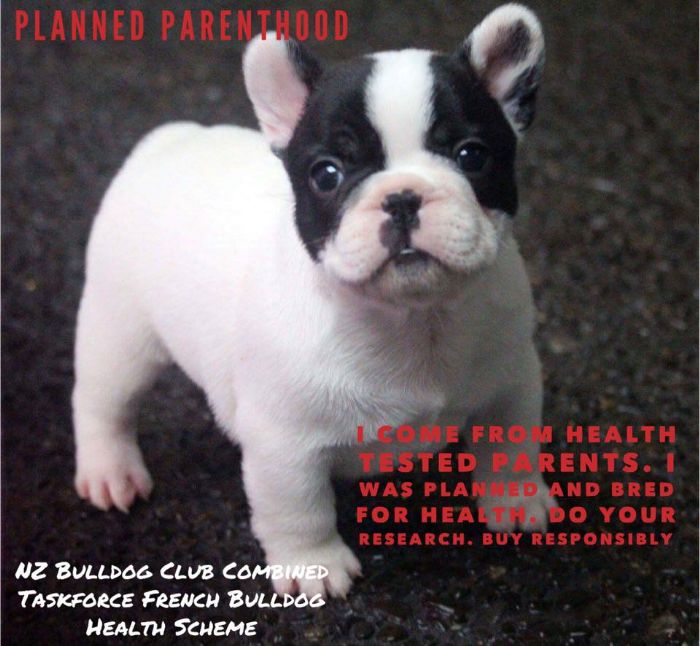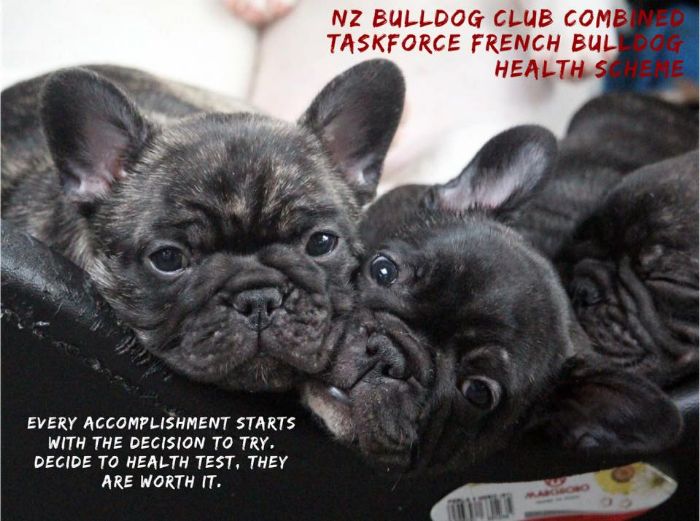Taskforce Health Scheme
Sub-links for this page

The Bulldog Club Combined Taskforce British and French Bulldog Health Scheme
Information Sheet
Purpose
The Taskforce has an approved term of reference which includes the consideration of options for improving the health of the British and French Bulldog breeds including the potential for establishing health schemes in line with the actions of other clubs overseas. The Taskforce therefore are establishing the British Bulldog Health Scheme (BBHS) and the French Bulldog Health Scheme (FBHS).
Background
It is acknowledged that both British Bulldogs and French Bulldogs, given their recent popularity are facing considerable public attention, as are all brachycephalic breeds. Prior to this a few breeders worked quietly and diligently to breed to the breed standard and to continue to improve the health of the breed. However, with popularity has come a rise in people who are not breeding for health, rather their interest is profit. Welfare groups are now publicly stating that the health of French bulldogs is at risk utilising research from other countries as there is none in New Zealand. Some are suggesting the breed should be banned. The Taskforce is tasked with working on a range of activities to counter this perspective, support our dog owners/breeders and to educate and inform the public.
Therefore, the Taskforce has a number of Terms of Reference including:
• Consider the range of methods used by international breed clubs and organisations to both reflect
and publicise good health testing practices and to hold health information;
During their work the Taskforce identified a number of reasons for health schemes including:
1. Promoting and supporting dog owner/breeders to start testing by:
i) Providing a clear indication of the tests that a breeder could undertake.
ii) Placing an emphasis on promoting health testing as part of an overall assessment. Not to exclude a dog but to enable a breeder to understand what is happening both outside and within their dog. On that basis the emphasis is on participation.
2. Building a data base of information and data – to again assist breeders but to also provide over time a database of health statistics that can be used by the clubs and taskforce to get more of an understanding of what is happening with our breeds and we hope over time seeing improvements in health and wellbeing. It will also provide statistics that we can use in response to perceived views of the breeds by third parties and the media.
3. Through an award system run by the clubs attached to the dog rather than the breeder providing a visible mechanism to advertise good health testing practices and hopefully distinguish responsible breeders from the irresponsible.
A number of international Health Schemes were considered when putting together the BBHS and FBHS together. The Taskforce spoke with international specialist vets, the Co Ordinator’s of international Health Schemes and gained insight into the effectiveness of the schemes and the lessons they had learnt. These were all included in the proposed BBHS and FBHS.
The intent has been to develop schemes that breeders, French Bulldog owners and the public can gain confidence in and that is accessible. The means of doing so include:
1) Placing an emphasis on promoting health testing as part of an overall assessment. Not to exclude a dog but to enable a breeder to understand what is happening both outside and within. On that basis the emphasis is on participation at bronze level with minimum requirements set from silver level.
2) Making the entry point at Bronze level doable, the purpose of which is to provide base level health review of the dog from 10 months old and non-invasive with the primary veterinarian check able to be undertaken at a single appointment. From this base of information breeders will be able to move forward to higher testing levels requiring DNA and x rays which will have set minimums required to gain awards.
3) Providing more than one recognised international grading optionxx, for spine and hip testing that allow for full sedation through to no sedation, x ray options. Thus, enabling dog owner/breeders to choose an option that they prefer for their dogs.
4) Providing for consistency of veterinarian service where possible through providing vets with set instructions and information for the scheme.
5) Establishing the basis for retention of data and information which:
a) Is held in a responsible manner respecting people’s right to have their information kept private;
b) while allowing for the utilisation of data in an anonymous statistical form unless agreed with the dog owner/dog owner/breeder.
6) Providing award certificates at each level which:
a) dog owner/breeders can use as advertising; and
b) allowing clubs, with consent for the dog owner/breeders to publicise those dogs that have reached award status.
It is hoped that by making the levels achievable, giving breeders testing options and veterinarian’s clear instructions this will give them confidence in the scheme as a whole, veterinarians and the systems in-place and also the quality of their dogs to participate.
Comment
This scheme is not about discounting dogs if an undesirable result occurs.
We emphasise to breeders one of the intents of the scheme is to give them information about their dogs that they can use when making decisions about their breeding program. Participation in both the BBHS and the FBHS is voluntary. Testing when done effectively will allow a breeder to take a considered approach. We would always recommend that when breeding and matching a dog to a bitch look for a better health result and consider if the progeny have improved from that combination. But the entire dog also needs to be taken into consideration. History has shown in breeding that being too aggressive in eliminating one issue in a breed can lead to unintended consequences such as other health conditions arising, caused by a range of reasons including sometimes the loss of dogs and lines affected with that one issue.
We repeat it is at breeders’ discretion to remove a dog from their breeding programme if they are not satisfied with a health result.
Who can be a-part of the BBHS and FBHS?
Both the BBHS and the FBHS are available to breeders or owners who are members of the Bulldog clubs.
Criteria will be established for entry into the scheme. This will include:
• Membership in one of the Bulldog clubs or in a Registered DogNZ Breed or All Breeds Club
• Microchipped required for certification identification
• Dogs must meet the colour requirements set under the NZ French Bulldog Breed Standard and.
• Consent to hold testing information for data collection purposes or if willing award notice to be shared on club’s website.
Why are Non-Standard Coloured Dogs excluded?
We have placed an emphasis on keeping non-standard dogs out of the scheme because of a number of reasons:
• Non-standard coloured dogs are not approved under our breed standard and not supported by our clubs or the taskforce.
• The bases for the non-inclusion of Non-standard coloured dogs in our breed standard and in breeding programs is based upon a number of reasons including but not exclusively a long history of health-related issues relating to their colour and that to get most of those colours other breeds have to be introduced as they don’t naturally occur in British Bulldogs or French bulldogs.
Therefore, to include non-standard coloured dogs would be inappropriate. To ensure that the schemes do not include such dogs they will be required to get vet or club confirmation of colour at Bronze level and for the FBHS provide proof via DNA testing and or parentage at the Silver level.
Costs
As with all testing there will be a cost. We acknowledge the need to manage this and as an entry point the first bronze testing can be undertaken should the breeder wish, at a single appointment with a vet. We hope this will keep costs to a single consult.
Over time the Taskforce wish to develop relationships with vets and hopefully agree discounts for testing.
Veterinarians
The Taskforce recognises the need for testing to be as objective as possible. While this could suggest that the best option might be to use a few approved veterinarians to do the tests, the Taskforce understand that breeders are located across the country and need to use their vets for the scheme to be accessible. The Taskforce will therefore provide breeders and vets with FBHS instructions and support. The intent will be as much as possible to allow dog owner/breeders throughout NZ to use their veterinarians and have confidence they will not be disadvantaged by varying results and interpretations.
We have a number of vets across the country who are working with us and will have experience with the schemes. We can provide details if requested.
Exercise Tolerance Testing for BOAs (ETT)
The ETT is a test developed by Cambridge University in the UK to test the breathing of brachycephalic breeds such as ours. It is currently being provided at Massey University in Palmerston North and at TCI Vets in Fielding. However, for testing to be promoted by the FBHS the taskforce consider that it must be accessible across the country. Further it is important that vets have instructions and are able to be as subjective as possible when completing the test assessment.
We now have the instructions and are working to build support with vets around the country to make it accessible. On that basis we have placed the ETT in the silver level of the BBHS and FBHS for now with observation assessments at bronze level. We propose that this approach is reviewed in a year’s time if not sooner hopefully by then ETT testing is available to all. Taking this approach will allow the schemes to move forward quickly at least to bronze level. If breeders wish to move to silver we will consider options to do so in advance of the ETT roll out.
Who owns the Bulldog and French Bulldog Health Testing Scheme?
Like other Health Schemes in the UK and USA the NZ clubs will own the BBHS and FBHS and manage it through an agreed Co-Ordinator. Both the UK and USA schemes have set rules for the management of the scheme and retention of information and a dedicated co-ordinator to manage it. The integrity of the scheme is paramount and information is only released with consent. The Taskforce have developed a set of privacy information and consent forms for both the BBHS and FBHS.
Finally, we note that the BOAs Chamber will likely be owned by one or both of Massey University and DogsNZ. DogsNZ may therefore have access to the outcomes and information from the chamber via that process. This will be separate from the BBHS and FBHS but we will accept the results supplied by breeders as part of certification.

